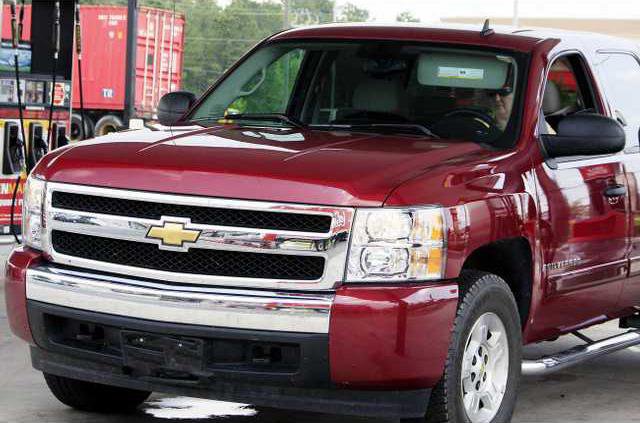Without an end in increasing fuel costs in sight, many consumers and small businesses are clamping down on unnecessary costs and purchases. The three biggest domestic auto manufacturers have all reported a drop in overall sales in 2008, and the local dealerships also have felt the crunch.
Springfield Ford owner Harry Mahn reports that their first quarter sales in 2008 were down by 20 to 30 percent compared to 2007.
Tommy Arden of Fuller Chevrolet said sales were down by 31 percent from January to May 31 compared to last year’s. However, Adam Kaminsky, general manager of Springfield Chrysler, reports only a 10 percent decrease in sales in the first quarter.
Yet despite rising fuel costs and decreasing auto sales, the dealerships’ management remains optimistic about the state of the automotive industry in Effingham County, relying on company adjustments to the market trend.
“Everything has slowed down,” Mahn said. “But when things are slow, it’s a good time for the public to buy, not the dealers, but the public.”
Finding a balance between cutting costs, adjusting inventory and offering more incentives seems to be crucial to adapting to the market.
“You used to be able to order cars, and then sell them,” Kaminsky said. “But now you have to be a little smarter, because people are putting more thought into what they are buying.”
Ford, GM and Chrysler have been working on strategies to overcome a fuel-dependent economy and to lure in more customers with incentives and product changes.
“When incentives are great, it’s the time to buy,” Arden said.
Adding incentives to a vast product selection also increases sales opportunities.
“There’s so much more for customers,” Kaminsky said. “The selection is the best it’s ever been. Smart, logical thinkers will evaluate all the factors - interest rates, incentives - and then weigh them against the gas prices.”
According to Kaminsky, if there weren’t any rebates or incentives, people wouldn’t buy.
Chris Gorsuch, new car manager at Fuller Chevrolet, said they offer bigger discounts on Tahoes and Silverados now. And it seems to have paid off for them.
Although their sales of larger trucks have decreased by 50 percent, the Silverado is still their number one sale, but with one exception.
“It is tied with a car which is something we never thought would happen with Chevrolet,” said Arden.
The car that shares the number-one seat is the Aveo, averaging 40 miles per gallon.
Kaminsky’s biggest sales also continue to be trucks and vans. Sales in April were higher than they have been in the past 18 months. It seems the topographical geography of the county could be playing a factor.
“Effingham County has always been a truck county. Geographically, we’re just truck country,” Gorsuch said.
For Clyo resident Patricia McDaniel buying a truck or larger vehicle was necessary. She used to have a Ford Escort but found she had a tough time driving down her driveway after rain. She and her husband Jack of McDaniel Painting bought a Silverado in September.
“This truck, to be big, actually gets really good gas mileage,” she said.
The Silverado utilizes what GM calls advanced fuel technology, which according to Gorsuch helps consumers conserve gas by adjusting the engine speed from eight cylinders to four cylinders when you don’t need the horsepower.
“(It) can get you up to 22 mpg, which is unheard of in a truck,” said Gorsuch.
Across the board, auto manufacturers are gearing up to make the necessary changes the market demands.
Chrysler announced this week that it’s extending its “Let’s Refuel America” program until July 7. The program, which was originally scheduled to expire on June 2, locks in a gas price of $2.99 per gallon for three years (up to 12,000 miles per year) for those who purchase or lease a vehicle during the specified time frame. Consumers have to have either a Visa or a MasterCard credit card to participate.
Chrysler also offers a lifetime warranty on their vehicles now, which Kaminsky says has really impacted the number of people he sees that come in to trade for another model. Now, more customers just bring their vehicle in to be serviced instead.
Ford Motor Company announced in a press release this week that “all 2008 model F-Series, except Harley Davidson and chassis cab models, will be sold at employee discounted price plus cash incentives” during June.
GM’s also busy, announcing in a press release on Tuesday its plans to “revitalize its car lineup and grow its crossover business” by focusing initiatives on such things as product and technology.
“They’re (GM) trying all they can to overcome fuel prices,” Gorsuch said. “Ninety percent of the GM vehicles have flex fuel.”
Flex fuel — consisting of 85 percent ethanol and 15 percent gas — costs about fifty cents less per gallon. However, it’s not available in the Southeast right now.
Another key element to weathering the transitions in the current automotive buying is for dealers to readjust their inventory.
“We use to keep 90 percent trucks/SUVs and 10 percent cars,” said Mahn. “Now we’re 60 percent trucks/SVUs and 30 to 40 percent cars.”
The top sellers for Mahn this year have been the Focus, Fusion, Edge, Taurus and Escape. He’s adjusted his inventory accordingly.
“You have to go toward what is selling and what the trend is,” Mahn said.
The biggest factor that has affected truck sales in Effingham County has been fleet sales.
“A lot of the people I sell to are in the construction business,” Kaminsky said.
Both Arden and Mahn have felt the effects of a downturn in the construction/building business. Truck sales are down because both small construction companies and builders are not buying because of the cost of fuel and diesel, Mahn said.
In fact, diesel prices have affected consumers in another more direct way: through trade-in value.
“The trade in value of larger vehicles is not what it use to be,” Kaminsky said. “It use to be way over blue book value, but now they are not even in the ballpark.”
According to Arden, “It costs six to eight to $10,000 to trade in a diesel, which isn’t worth it in the long run.”
So what should people do?
“Don’t panic, it will come back around,” said Arden, who has been selling cars for 40 years.
All three local dealerships project sales for the remainder of the year to either stay the same or decrease only slightly.











